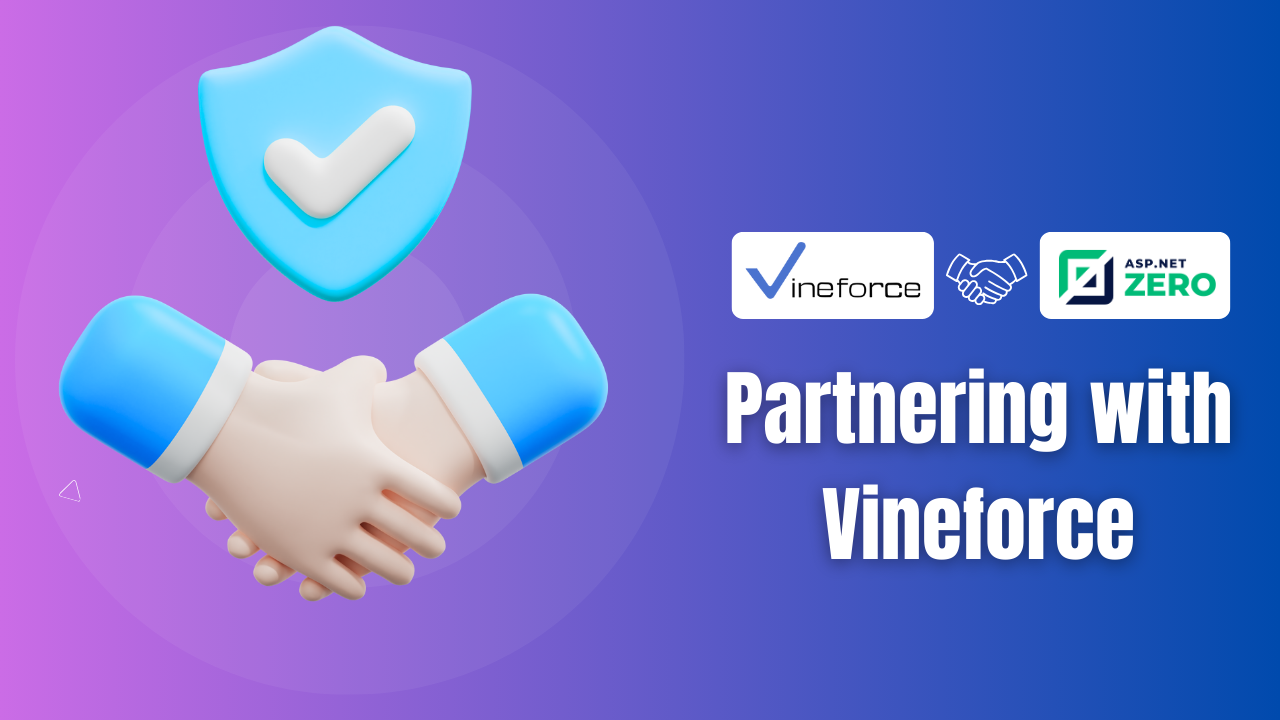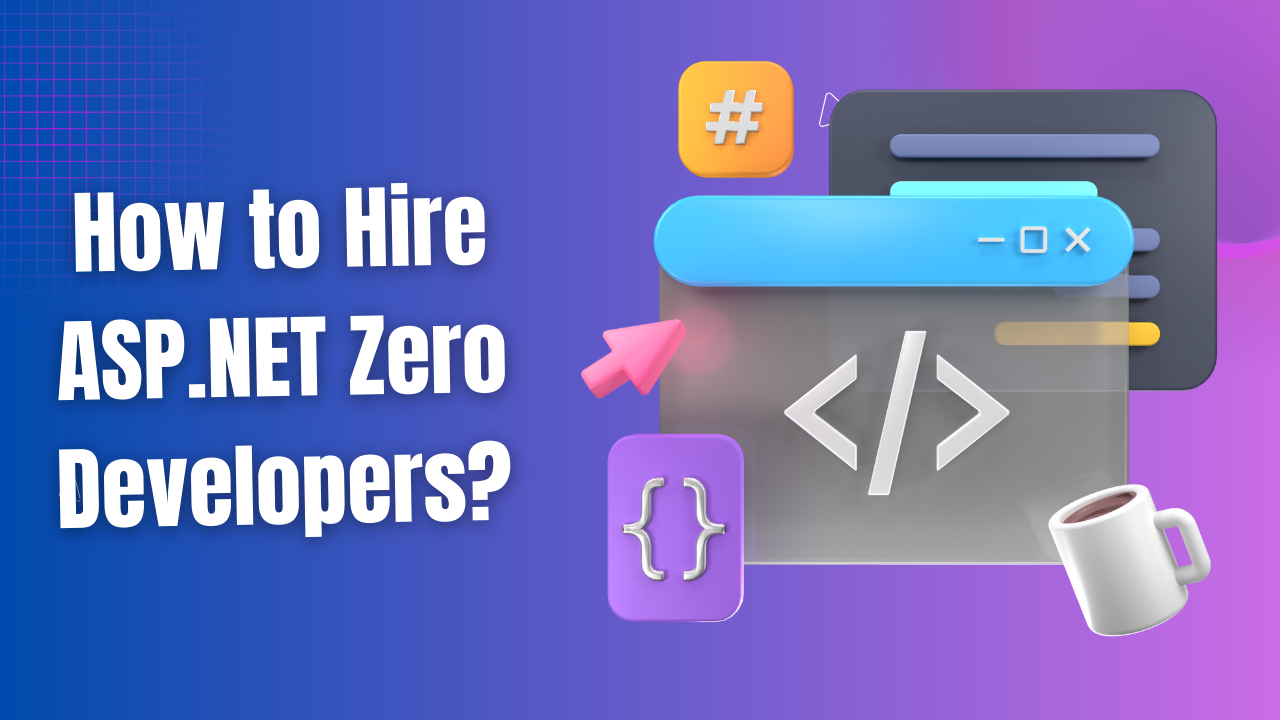Are you interested in starting a web development project using ASP.NET Zero, but not sure where to begin? Whether you’re a business looking to create an advanced web application or a developer wanting to improve your skills, hiring the right people is essential for success. In this guide, we’ll take you step-by-step through the process of hiring ASP.NET Zero developers, covering everything from understanding the framework to making your final hiring decisions. We’ll discuss important factors like writing effective job descriptions, using job websites, conducting interviews, and even forming partnerships with companies like Vineforce. By the end, you’ll have the knowledge and insights you need to build a great development team or partner with experts to bring your ASP.NET Zero project to life.
Explanation of ASP.NET Zero framework and its features
ASP.NET Zero is like a toolbox for building websites and applications. It’s designed to make the job easier, especially for big projects. It’s built on top of some other technologies, which give it a strong foundation.
One of the cool things about ASP.NET Zero is that it comes with a bunch of pre-made parts that developers can use. These parts help with things like managing users, making sure only the right people can access certain parts of the site, and handling multiple users or companies using the same app.
ASP.NET Zero also follows some good rules and ways of doing things, which make it easier for developers to work with. It plays nicely with popular tools for making the front part of websites, like Angular or React.
Besides all the things it already does, ASP.NET Zero can be customized a lot. Developers can tweak how it looks, add new features, or even plug in other tools they like using. So whether you’re making a simple website or a huge business application, ASP.NET Zero can handle it.
Now, let’s talk about what skills you need to use ASP.NET Zero:
Know ASP.NET Core: This is like the engine that powers ASP.NET Zero. You need to understand how it works, how to make web pages with it, and how to manage different parts of a website.
Be good at C#: ASP.NET Zero is mostly written in a language called C#. You should know how to write code in C#, work with different types of data, and handle errors when things go wrong.
Understand Entity Framework Core: This is the part that deals with storing and managing data in a database. You need to know how to design databases, write queries to get data, and make sure everything works smoothly.
Learn front-end stuff: This means knowing how to make web pages look good and work well. You should be comfortable with HTML, CSS, and JavaScript. Plus, it’s helpful to know how to use popular tools for making the front part of websites, like Angular or React.
Get the hang of authentication and authorization: These are big words for making sure only the right people can access certain parts of a website. You need to understand how to set up user accounts, log people in securely, and control who can do what.
Know about modular architecture: ASP.NET Zero is built in a way where you can mix and match different parts. You need to understand how to design and build these parts, and how to make sure they all work together nicely.

Defining Your Project Needs
Before diving into hiring ASP.NET Zero developers, it’s crucial to have a clear understanding of your project goals, objectives, and specific requirements. This initial step lays the foundation for a successful hiring process and ensures that you find developers who are the right fit for your project.
A. Clarifying Project Goals and Objectives
Start by defining the overarching goals and objectives of your project. What do you aim to achieve with your ASP.NET Zero application? Are you looking to build a new web application from scratch, or do you need to enhance an existing one? Consider aspects such as functionality, user experience, scalability, and time-to-market. Additionally, think about the target audience for your application and what you hope to accomplish by reaching them.
B. Identifying Specific Requirements for Your ASP.NET Zero Project
Once you’ve established your project’s goals and objectives, it’s time to drill down into the specific requirements for your ASP.NET Zero project. This includes both functional and non-functional requirements:
Functional Requirements: These are the features and functionalities that your ASP.NET Zero application must have to fulfill its purpose. Consider elements such as user authentication and authorization, role-based access control, multi-tenancy support, data management, reporting, and integration with third-party systems. Prioritize these requirements based on their importance to your project’s success.
Non-Functional Requirements: In addition to functional requirements, consider non-functional aspects that impact the overall performance, security, and usability of your ASP.NET Zero application. This includes factors such as performance optimization, security measures (e.g., data encryption, secure authentication), accessibility compliance, and scalability to accommodate future growth. Pay attention to any regulatory or compliance requirements that may apply to your project, such as GDPR or HIPAA compliance.
Finding ASP.NET Zero Developers
Once you know what you need for your project, it’s time to find the right ASP.NET Zero developers. Here are some ways to do it:
1. Online Platforms:
Websites like Upwork, Freelancer, and Toptal are great for hiring developers. You can post your job, check out developers’ profiles, and chat with them.
Advantages:
- You get access to lots of developers with different skills.
- You can see their past work and feedback from other clients.
- You can choose how you want to pay them, like by the hour or for the whole project.
Considerations:
- There might be a lot of competition, so it could take a while to find the right person.
- You’ll need to spend time checking out each developer to make sure they’re good.
2. Professional Networks:
Places like LinkedIn, GitHub, and Stack Overflow are full of developers. You can connect with them, join groups, and talk about your project.
Advantages:
- You can find developers who specialize in ASP.NET Zero.
- You can chat with them and get recommendations from people you know.
Considerations:
- It might take time to build relationships with developers.
- You might not know if they’re available for your project.
3. Outsourcing vs. In-house:
Decide if you want to hire freelancers or build a team in-house.
Outsourcing:
- It can be cheaper and faster for short-term projects.
- You can find developers from all over the world.
- You can adjust how many developers you need as the project goes on.
In-house:
- You have more control over the project.
- Your team can work closely together and learn from each other.
- It’s a long-term investment in your team’s skills and growth.

Partnering with Vineforce
Partnering with Vineforce means more than just coding – it’s about reaching your project’s full potential. With their skills and ASP.NET Zero‘s strong foundation, you’re not just building a project, you’re setting a course for success. Let Vineforce guide you to new heights with your ASP.NET Zero project.
Important Things to Think About, Including Working with Vineforce
When you’re hiring ASP.NET Zero developers, it’s not just about their technical skills. Here are some other important things to consider:
A. Good at Talking
It’s really important for everyone on the team to be able to talk to each other well. Look for developers who can explain their ideas clearly, listen to others, and talk openly and honestly. This helps avoid confusion and makes sure everyone can work together smoothly.
B. Team Player
Working on an ASP.NET Zero project means working with lots of other people, like designers and project managers. So, it’s important to hire developers who can get along with others, share their ideas, and work together to reach goals.
C. Fit in with Your Team and Vineforce
It’s not just about skills – it’s also about finding developers who fit in well with your team. Look for people who share the same values and work well with others.
Plus, teaming up with Vineforce adds something extra to your project. Their expertise and teamwork style match with yours, making it easier to work together. By teaming up with Vineforce, you’re not just getting better at the technical stuff – you’re also creating a culture of innovation and teamwork.
Onboarding Your ASP.NET Zero Developer
Bringing a new ASP.NET Zero developer onto your team is an exciting step towards achieving your project goals. However, effective onboarding is crucial to ensure their success and integration into your development team. Here are some recommendations for onboarding your new ASP.NET Zero developer
A. Providing Necessary Resources:
Access to Tools and Software: Ensure that your new developer has access to all the necessary tools and software required for ASP.NET Zero development. This may include IDEs (Integrated Development Environments) like Visual Studio, source control systems, and any proprietary tools or frameworks used in your development environment.
Documentation and Training Materials: Provide comprehensive documentation and training materials that cover the ASP.NET Zero framework, coding standards, project architecture, and any specific guidelines or best practices followed by your team. This will help your developer get up to speed quickly and understand how your projects are structured.
Access to Support and Mentorship: Assign a mentor or experienced team member who can provide guidance and support to the new developer during the onboarding process. Encourage open communication and regular check-ins to address any questions or concerns they may have.
B. Setting Clear Expectations:
Define Roles and Responsibilities: Clearly define the roles and responsibilities of your new developer within the project team. Provide a detailed overview of their tasks, deliverables, and deadlines to ensure they understand their contribution to the project.
Establish Communication Channels: Set up communication channels, such as team meetings, email, or project management tools, to facilitate collaboration and information sharing within the development team. Encourage active participation and collaboration among team members to foster a supportive and productive work environment.
Clarify Project Goals and Objectives: Ensure that your new developer understands the overarching goals and objectives of the project, as well as the specific milestones and targets they are working towards. This will help align their efforts with the broader project vision and ensure that everyone is working towards the same objectives.
Provide Feedback and Evaluation: Establish a feedback mechanism to provide ongoing feedback and evaluation to your new developer. Encourage regular performance reviews and check-ins to identify areas for improvement and provide support as needed.
Conclusion
In conclusion, hiring the right ASP.NET Zero developer is crucial for the success of your project. In this guide, we covered important aspects such as technical skills, communication, teamwork, and company culture. Here’s a quick recap:
Technical Skills Matter: Look for developers who know ASP.NET Core, C#, Entity Framework Core, HTML, CSS, and JavaScript.
Communication and Teamwork are Key: Find someone who can communicate effectively and collaborate well with others.
Consider Company Culture: It’s important to find someone who fits in with your company’s values and vibe.
Consider Partnering with Vineforce: For extra help or expertise, consider teaming up with Vineforce. They can elevate your ASP.NET Zero project to the next level.
By hiring the right developer and fostering a collaborative work environment, you’ll be on the path to success. Don’t hesitate – start your journey of finding the perfect ASP.NET Zero developer today!


